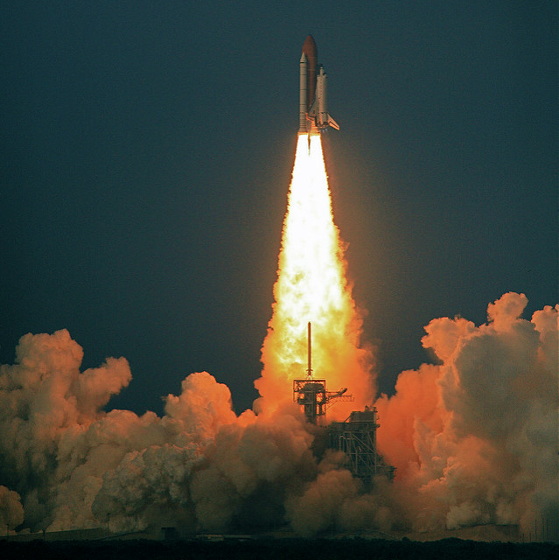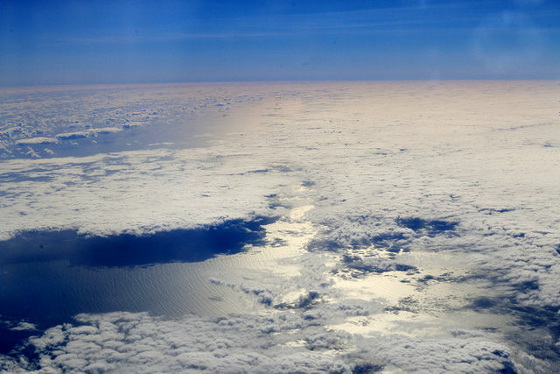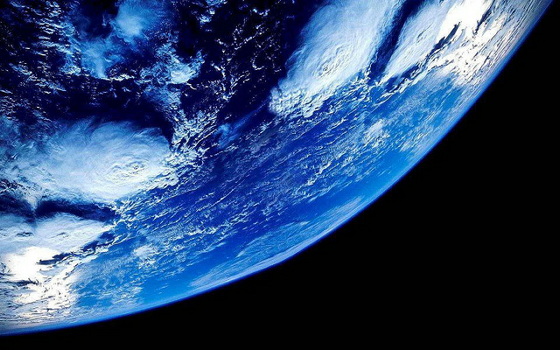The propellant gas of the rocket may affect the environment of the earth by changing the composition of the atmosphere

ByNASA HQ PHOTO
Many rockets are launched into space every year by space development programs proceeded in various countries around the world and private space development companies like SpaceX in recent years. A large amount of combustion gas is expelled from the rocket engine at the time of launch with a tremendous explosion sound, but it is assumed that there is a possibility that the substance occurring at this time may change the atmosphere of the earth, grasp the actual situation with the data There is a need to cast.
Why it's time to study how rocket emissions change the atmosphere - The Verge
https://www.theverge.com/2018/5/31/17287062/rocket-emissions-black-carbon-alumina-particles-ozone-layer-stratosphere
The rocket launched from the launch pad will fly to the universe leaving dazzling lights, rumblings, and white smoke. The rocket can launch cargo of hundreds of kilograms to dozens of tons and put it in orbit around the earth, but at the time of launch it consumes about ten times the mass of cargo as the cargo mass I will.

BySteve Jurvetson
In most cases, the fuel used for rockets is almost the same as keroseneKeroseneAnd liquid hydrogen are used, and by mixing these burning agents with liquid oxygen and burning it, extremely strong force is created. In the case of a "solid fuel rocket" which does not use a liquid fuel, a combustion gas is injected by igniting a mixture of a solid fuel packed in a rocket's body and an oxidizing agent, and a strong force is similarly applied It creates.

The following movie contains a state of burning test of solid fuel rocket. At the time of launch, 630 tons of solid fuel will run out in as little as 120 seconds.
SLS Qualification Booster Test at Orbital ATK - YouTube
Although it seems that the substance generated by burning fuel, for example, "greenhouse effect carbon dioxide" is often mentioned, in fact it is not necessary to worry too much about the greenhouse gas generated by the launch of the rocket. Martin Ross, who is studying the impact of rockets on the atmosphere at the non-profit organization The Aerospace Corporation, said, "Rocket business is expected to increase at the current 1000-fold level, but the emitted carbon dioxide And the influence of water vapor are still smaller than greenhouse gases produced by economic activities around the world ".
Rather it is a substance such as "soot" that remains when kerosene is burned and small aluminum powder "alumina" contained in the fuel of a solid rocket. As you can imagine the stove when incompletely burning, you can see that kerosene made from petroleum will be sooted by combustion. Also, in the case of solid fuel rockets, a large amount of alumina is mixed in the solid fuel in order to increase the injection speed of the combustion gas. These substances are scattered in the atmosphere of the Earth during the launch of the rocket and there is concern that the effect of staying in the atmosphere for 5 years will be long.
Previous studies have already confirmed that these substances are contained in the atmosphere at an altitude of 10 km to 50 km. Originally, these substances should not exist in this atmosphere, so it is almost certain that it was brought about by the launch of the rocket.

ByWILL POWER
It is known that these substances floating in the air in the sky will decompose the allotrope of oxygen, ozone. It is well known that ozone has the role of forming an ozone layer at a high place in the atmosphere and shielding ultraviolet rays falling from the universe, but the substance exhaled from the rocket is gradually destroying this ozone layer It is gradually becoming obvious. Of course, since ozone continues to be produced constantly, it will not be depleted someday. However, if the number of rockets launched increases dramatically in the future, it is thought that the ozone layer will have a strong influence which has never been before. Yes.
The number of rockets launched annually in 2018 is about 80 to 90, and Mr. Ross calculates that "soot" and alumina discharged from these rockets total 11 tons. However, it is almost certain that the rocket launch frequency will increase in the future, and as rocket launch using the same technology as now increases, the amount of discharge sprinkled into the atmosphere will inevitably increase further . Besides the fact that these substances are supposed to cause the destruction of the ozone layer as described above, there is also a certain influence on solar radiation as "soot" shields the sun's light, which in turn affects weather as well It is seen. In addition, it is suggested that these substances are diffused to the whole Earth from the rocket launch site on the westerly wind and the like in the sky, causing abnormal weather in various places.

ByBeth Scupham
Mr. Roth and his colleague, Jim Veda, say that for further investigation a more detailed investigation of the impacts of these emissions should be carried out. Since the data obtained so far are inferences that are derived from only a small portion of the data in the sky and the research results obtained in the laboratory later, actual data It is claimed that it is necessary to grasp.
Related Posts:







